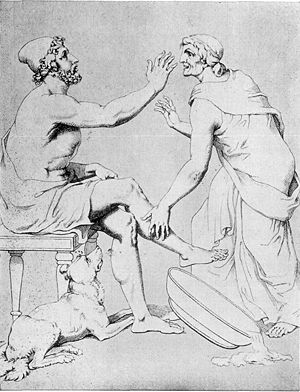
Euryclea
Encyclopedia

Greek mythology
Greek mythology is the body of myths and legends belonging to the ancient Greeks, concerning their gods and heroes, the nature of the world, and the origins and significance of their own cult and ritual practices. They were a part of religion in ancient Greece...
, Eurycleia - Εὐρύκλεια, Eurýkleia, or Euryclea (also known as Antiphata - Ἀντιφάτη in other traditions), is the daughter of Ops and granddaughter of Peisenor, as well as the wet-nurse of Odysseus
Odysseus
Odysseus or Ulysses was a legendary Greek king of Ithaca and the hero of Homer's epic poem the Odyssey. Odysseus also plays a key role in Homer's Iliad and other works in the Epic Cycle....
. As a girl she was bought by Laertes, Odysseus' father. He treated her as his wife, but she was never his consummated lover so as not to dishonor his real wife, Anticleia. She nursed Odysseus and Telemachus, Odysseus' son.
Eurycleia's name means "broad fame," while Anticleia means "anti-fame." The tension between the meanings of Eurycleia's name and Anticleia's name reflects the tension between the two pillars of Odysseus' life. He was born to Anticleia, a noble woman, but was nursed (and essentially raised) by Eurycleia, a lower class maid. Odysseus' fame comes from his role as a noble hero paralleled to his role as an anonymous beggar. His heroism is essential for capturing Troy; his skills as an orator and schemer as well as his strength and skills on the battle field are instrumental in the success of the Greeks. However, he takes on the role of a beggar not once, but twice. He first appears as a beggar to sneak into Troy and kill unsuspecting Trojan soldiers, and again when he returns home to Ithaca and plans to kill all of Penelope's suitors. In many ways, his role as a beggar, especially when he returns to Ithaca is far more meaningful. His re-entry into his own home after twenty years is arguably the most important moment of his life, perhaps suggesting that his role as a beggar - and his connection with Eurycleia - is what is most important to him.
Thus, it is fitting that in the Odyssey
Odyssey
The Odyssey is one of two major ancient Greek epic poems attributed to Homer. It is, in part, a sequel to the Iliad, the other work ascribed to Homer. The poem is fundamental to the modern Western canon, and is the second—the Iliad being the first—extant work of Western literature...
, Eurycleia is the first person to recognize him after he returns home from the Trojan War
Trojan War
In Greek mythology, the Trojan War was waged against the city of Troy by the Achaeans after Paris of Troy took Helen from her husband Menelaus, the king of Sparta. The war is among the most important events in Greek mythology and was narrated in many works of Greek literature, including the Iliad...
. After he enters his own house as a guest of Penelope
Penelope
In Homer's Odyssey, Penelope is the faithful wife of Odysseus, who keeps her suitors at bay in his long absence and is eventually reunited with him....
disguised as a beggar, Eurycleia bathes him and recognizes him by a scar just above his knee, which he got from a boar
Boar
Wild boar, also wild pig, is a species of the pig genus Sus, part of the biological family Suidae. The species includes many subspecies. It is the wild ancestor of the domestic pig, an animal with which it freely hybridises...
while hunting with his grandfather Autolycus
Autolycus
In Greek mythology, Autolycus was a son of Hermes and Chione. He was the husband of Neaera, or according to Homer, of Amphithea...
. Odysseus stops her from telling Penelope or anyone else in the house of his true identity: Gripping her by the throat he says, "Nanny, d'ye want to destroy me?...not another soul must know. Or...I will not spare even you my nurse, when I kill the other women in this house." (as translated by W.H.D. Rouse, The Odyssey,published by Mentor Books, 1955)
Eurycleia also informs Odysseus which of his servant girls had been unfaithful to Penelope during his absence, conspiring with Penelope's suitors and becoming their lovers. Among them was Melantho
Melantho
Melantho, also known as Melántho or Melanthó , is one of the minor characters in The Odyssey. Described as having a "sharp tongue", she is sister to Melanthios, a goatherd in Ithaca, and the daughter of Dolios...
. His son Telemachus
Telemachus
Telemachus is a figure in Greek mythology, the son of Odysseus and Penelope, and a central character in Homer's Odyssey. The first four books in particular focus on Telemachus' journeys in search of news about his father, who has been away at war...
hangs the twelve that Eurycleia identifies.
Later, Eurycleia informs Penelope that Odysseus has returned, but Penelope does not believe the maid. Penelope then tests Odysseus to prove that he is indeed her husband and asks him to move the bed Odysseus built in their marriage-chamber; Odysseus tells Penelope that this is not possible, as one of the legs of the bed is built into a live olive tree, a secret that only Penelope and Odysseus would know. She finally accepts that her husband has returned.
In addition, it was Eurycleia who gives provisions and supplies to Telemachus from the storehouse before he leaves for Pylos to seek news about Odysseus. She takes an oath not to tell Penelope he had left until 12 days had passed; Telemachus did not want his mother to worry any more than she already was.

